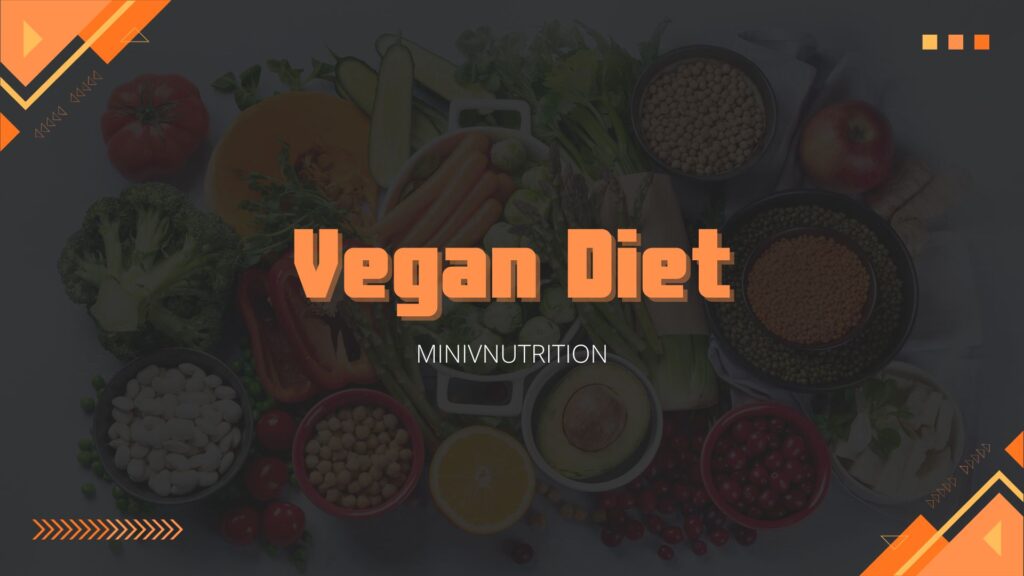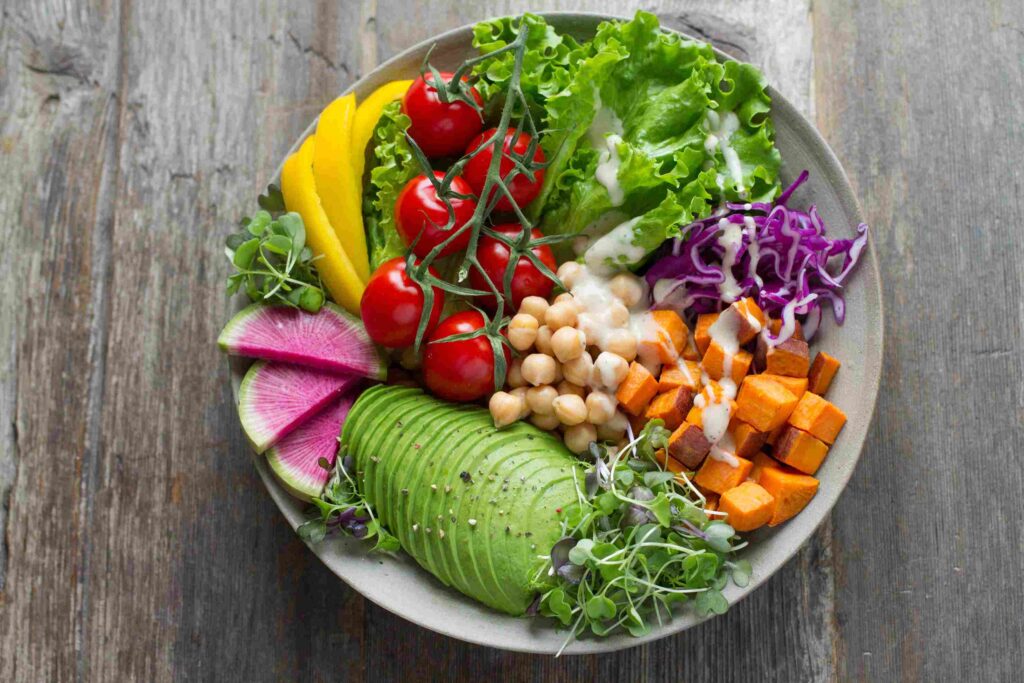The vegan diet, which excludes all animal products, has gained popularity for its potential health benefits and contribution to weight loss. This comprehensive guide will explore the benefits of a vegan diet, how to plan a healthy and balanced vegan eating plan, and provide essential information on protein sources, healthy fats, fiber-rich foods, and avoiding nutrient deficiencies while following a vegan lifestyle.

Table of Contents
Benefits of a Vegan Diet for Weight Loss and Health
- Weight Loss: A vegan diet can be an effective strategy for weight loss due to its emphasis on plant-based foods, which are generally lower in calories and saturated fats compared to animal-based options.
- Reduced Risk of Chronic Diseases: Numerous studies have linked vegan diets to a decreased risk of chronic diseases such as heart disease, type 2 diabetes, and certain cancers. The avoidance of animal products may contribute to these protective effects.
- Better Digestion: A plant-based diet is typically higher in fiber, which promotes healthy digestion and regular bowel movements. This can help prevent constipation and support overall gastrointestinal health.
- Improved Energy Levels: Many individuals report increased energy and vitality when they transition to a vegan diet. The abundance of whole, nutrient-dense foods in this diet can contribute to improved physical and mental well-being.
How to Plan a Healthy and Balanced Vegan Diet
- Variety is Key: Ensure a diverse nutrient intake by including a wide range of fruits, vegetables, whole grains, legumes, nuts, and seeds in your diet. Different plant foods offer various vitamins, minerals, and phytonutrients essential for health.
- Protein: Meet your protein needs with plant-based sources such as tofu, tempeh, beans, lentils, quinoa, and nuts. Combining complementary sources, like beans and rice, can enhance protein quality.
- Healthy Fats: Incorporate sources of healthy fats like avocados, nuts, seeds, and olive oil. These provide essential fatty acids, including omega-3s, which are important for overall health.
- Fiber: Consume plenty of fiber-rich foods, including whole grains, legumes, fruits, and vegetables. Fiber supports digestion, aids in satiety, and helps regulate blood sugar levels.
- Vitamins and Minerals: Pay attention to specific nutrients commonly found in animal products:
- Vitamin B12: Vegan sources are limited, so consider fortified foods or supplements.
- Vitamin D: Ensure adequate sun exposure or consider a vitamin D supplement.
- Calcium: Include calcium-fortified plant-based milk, leafy greens, and tofu in your diet.
- Iron: Consume iron-rich foods like legumes, whole grains, nuts, seeds, and dried fruits. Pair these with vitamin C-rich foods to enhance iron absorption.
- Supplementation: Depending on your diet and individual needs, consider supplements for specific nutrients. Consult a healthcare provider or registered dietitian for personalized guidance.

Protein Sources for Vegans
- Tofu: Tofu is a versatile source of protein that can be used in a wide range of dishes. It’s made from soybeans and comes in various textures, making it suitable for stir-fries, scrambles, sandwiches, and even desserts.
- Legumes: Beans (such as black beans, kidney beans, and pinto beans), lentils, and chickpeas are rich in both protein and fiber. They can be the foundation of hearty soups, stews, salads, and plant-based burgers.
- Nuts and Seeds: Almonds, peanuts, chia seeds, and hemp seeds are excellent protein sources. They can be enjoyed as snacks, sprinkled on salads, blended into smoothies, or used as a base for homemade energy bars.
- Tempeh: Made from fermented soybeans, tempeh is a nutrient-dense protein source with a nutty flavor. It’s a great addition to sandwiches, stir-fries, and grain bowls.
Healthy Fats for Vegans
- Avocado: Avocado is a powerhouse of healthy monounsaturated fats, making it a perfect addition to salads, sandwiches, or as a creamy base for vegan sauces and dips.
- Nuts: Almonds, walnuts, and cashews provide healthy fats along with a variety of vitamins and minerals. They make for nutritious snacks and can also be incorporated into desserts, granolas, and salads.
- Seeds: Flaxseeds, chia seeds, and hemp seeds are rich in omega-3 fatty acids, which are crucial for heart and brain health. These seeds can be added to oatmeal, yogurt, smoothies, or used as egg substitutes in vegan baking.
- Olive Oil: A staple in Mediterranean cuisine, olive oil is a source of heart-healthy monounsaturated fats. It can be drizzled over salads, used for sautéing vegetables, or as a dipping sauce for whole-grain bread.
Fiber-Rich Foods for Vegans
- Whole Grains: Brown rice, quinoa, oats, and whole wheat products like whole-grain bread and pasta are excellent sources of fiber. They provide sustained energy and support digestive health.
- Fruits: Berries (such as strawberries, blueberries, and raspberries), apples, pears, and oranges are high in fiber and essential vitamins. Enjoy them as snacks or add them to smoothies and breakfast bowls.
- Vegetables: Broccoli, Brussels sprouts, spinach, and kale are fiber-rich choices that also offer a wide array of vitamins and minerals. Incorporate them into salads, stir-fries, and side dishes.
- Legumes: In addition to their protein content, beans, lentils, and chickpeas are packed with fiber. They provide a feeling of fullness and are key components in soups, salads, and vegan chili.
Tips for Avoiding Nutrient Deficiencies on a Vegan Diet
- Vitamin B12: Consider a B12 supplement or fortified foods like plant-based milk or cereals.
- Vitamin D: Get sunlight exposure and consider a vegan-friendly vitamin D supplement.
- Calcium: Include calcium-fortified foods and calcium-rich greens like kale and collard greens.
- Iron: Consume iron-rich foods like lentils, beans, fortified cereals, and dried fruits with vitamin C-rich foods for better absorption.
- Omega-3 Fatty Acids: Incorporate flaxseeds, chia seeds, and walnuts.

A vegan diet can offer significant health benefits, including weight loss and reduced risk of chronic diseases. To create a healthy and balanced vegan eating plan, focus on variety, include plant-based protein sources, healthy fats, and fiber-rich foods.
Pay attention to key nutrients like B12, vitamin D, calcium, and iron, and consider supplements or fortified foods when necessary. With thoughtful planning and a well-rounded approach, you can achieve your weight loss and health goals on a vegan diet while enjoying delicious, plant-based meals.


